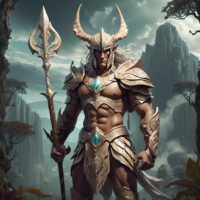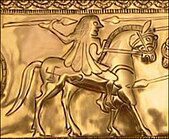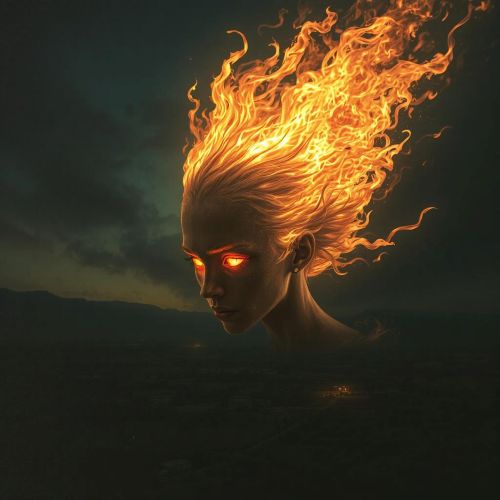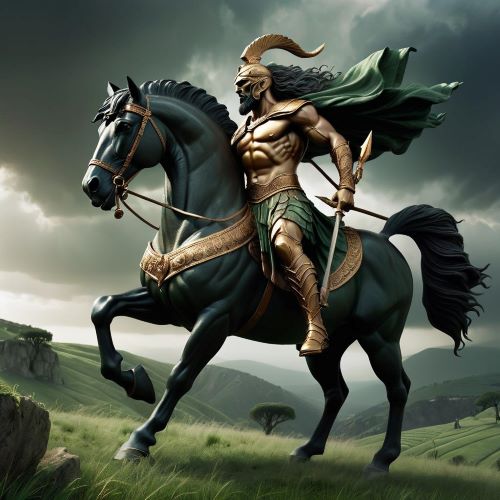Armatus : The God of War
Listen
At a glance
| Description | |
|---|---|
| Origin | Illyrian Mythology |
| Classification | Gods |
| Family Members | N/A |
| Region | Albania, Croatia, Bosnia and Herzegovina, Montenegro, and parts of Serbia and Slovenia. |
| Associated With | War, Courage, Strength |
Armatus
Introduction
Armatus is a central deity in Illyrian mythology, celebrated as the god of war. The Illyrians, ancient tribes of the western Balkan Peninsula, had a diverse pantheon that reflected their deep connection to nature, warfare, and spiritual beliefs. Armatus epitomizes the themes of strength, courage, and military skill, showcasing the martial expertise and strategic acumen revered by the Illyrians. His role in their mythology underscores his importance as a symbol of protection and the mystical aspects of life that shaped Illyrian culture. Despite the enigmatic details surrounding his origins and worship, Armatus remains a prominent and intriguing figure in the ancient Illyrian mythological tradition.
Physical Traits
In Illyrian mythology, Armatus is portrayed as an imposing and powerful figure, often depicted with a towering stature that underscores his role as a protector and warrior. His muscular physique is highlighted through traditional Illyrian armor, emphasizing his martial prowess and guardian role over the tribes. Artistic representations frequently showcase him in gleaming armor, wielding weapons such as a spear or sword, reflecting his combat readiness and expertise. The imagery also captures a fierce intensity in his eyes, symbolizing his relentless nature in battle. Additionally, the color red, associated with both blood and courage, is often linked to Armatus, further enhancing his formidable presence and the cultural sophistication of Illyrian artistry.
Family
The familial background of Armatus in Illyrian mythology remains largely unclear, a common feature in mythological traditions where oral transmission can lead to variations and gaps in the narrative. While detailed familial connections are sparse, it is suggested that Armatus might be related to other key deities in Illyrian lore, potentially aligning him with gods associated with war or nature. This indicates a broader, interconnected divine network. Some interpretations link Armatus to Greek mythology, portraying him as a son of Zeus and Hera, which may reflect cultural exchanges or adaptations between Greek and Illyrian mythologies. Despite the lack of concrete details, these associations highlight the integration of Armatus into a larger pantheon and the complex interplay of divine relationships that echo the social dynamics of ancient human societies.
Other names
Armatus, the Illyrian god of war, is known by various names and titles across different accounts and regions. This variation reflects the way myths evolve through oral traditions and regional adaptations. For instance, he might be referred to as “Armatus the Brave,” highlighting his valor and martial prowess. Local dialects and interpretations could also offer unique names that emphasize his widespread influence within Illyrian culture. These different designations enrich his mythological profile, indicating his significance and the diverse ways his legend was conveyed. Due to the fragmentary nature of Illyrian records, a comprehensive list of all his names remains elusive, but it is clear that his reputation was represented through various epithets that captured different facets of his warrior attributes and regional reverence.
Powers and Abilities
As the god of war, Armatus was a figure of immense power and prowess. His combat mastery was unparalleled, with abilities that went beyond those of mortal warriors. Armatus was renowned for his strategic brilliance, allowing him to devise effective tactics and secure victories in even the most desperate battles. His formidable strength and endurance enabled him to wield heavy weapons with ease and endure the rigors of prolonged warfare, cementing his reputation as a dominant force on the battlefield.
Armatus’s influence extended beyond mere physicality; he was also known for his ability to inspire courage in his followers. His presence was said to rally warriors, filling them with unwavering determination and bravery that could turn the tide of conflict in their favor. Additionally, his protective powers were a key aspect of his divine role. Armatus was believed to shield his worshippers from harm, deflecting blows and guiding them to avoid injury, which made him a cherished deity among soldiers and warriors.
Beyond his martial skills, Armatus was attributed with supernatural abilities related to natural elements, such as earth and fire. This connection to the natural world highlighted his role not only as a warrior but also as a guardian linked to the fundamental forces of the land. Such attributes reflected the Illyrians’ reverence for the environment and its dynamics, illustrating how Armatus’s powers were intertwined with their cultural and spiritual beliefs.
Modern Day Influence
Armatus’s legacy endures in modern culture, where his attributes of strength and valor are reimagined in various creative forms. Although less renowned compared to figures from Greek or Roman mythology, Armatus has begun to appear in contemporary literature, films, and other artistic works. These modern interpretations draw on his warrior persona, infusing stories with the essence of ancient Illyrian beliefs and showcasing how traditional themes can inspire new narratives.
His influence also extends into regional cultural identity, particularly in areas that were once part of the Illyrian world. In these regions, Armatus remains a symbol of resilience and heritage, with his story contributing to a renewed interest in Illyrian history. Academic and cultural efforts are focusing on promoting and understanding ancient Illyrian civilizations, which brings figures like Armatus back into public awareness as embodiments of enduring legacy and regional pride.
Additionally, Armatus’s image has influenced modern symbols and institutions, particularly within military contexts, where his attributes of courage and strategic acumen are celebrated. While direct worship of Armatus has waned, his mythological significance continues to resonate through cultural heritage, military symbolism, and scholarly research. Popular culture also keeps his memory alive, reflecting the timeless appeal of warrior deities and their relevance to contemporary themes of heroism and strength.
Related Images
Frequently Asked Questions
What is lorem Ipsum?
I am text block. Click edit button to change this text. Lorem ipsum dolor sit amet, consectetur adipiscing elit. Ut elit tellus, luctus nec ullamcorper mattis, pulvinar dapibus leo.
What is lorem Ipsum?
I am text block. Click edit button to change this text. Lorem ipsum dolor sit amet, consectetur adipiscing elit. Ut elit tellus, luctus nec ullamcorper mattis, pulvinar dapibus leo.
What is lorem Ipsum?
I am text block. Click edit button to change this text. Lorem ipsum dolor sit amet, consectetur adipiscing elit. Ut elit tellus, luctus nec ullamcorper mattis, pulvinar dapibus leo.
What is lorem Ipsum?
I am text block. Click edit button to change this text. Lorem ipsum dolor sit amet, consectetur adipiscing elit. Ut elit tellus, luctus nec ullamcorper mattis, pulvinar dapibus leo.
What is lorem Ipsum?
I am text block. Click edit button to change this text. Lorem ipsum dolor sit amet, consectetur adipiscing elit. Ut elit tellus, luctus nec ullamcorper mattis, pulvinar dapibus leo.





